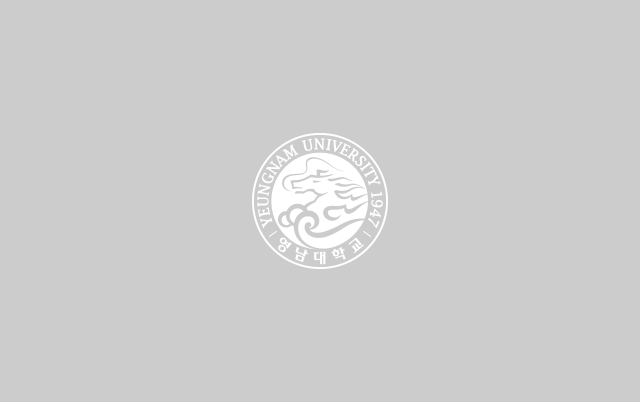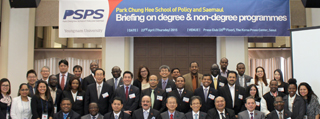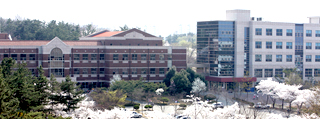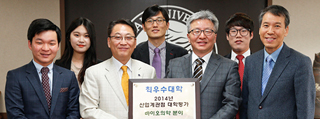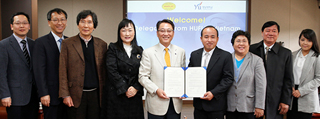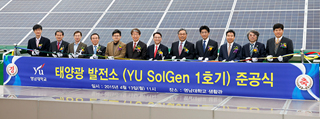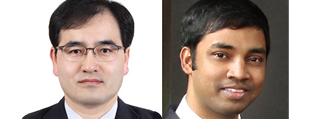-
YU President Noh Seok-kyun signs exchange agreement with the number 1 and 2 ranked universities of Mexico Global partnership expanding from Europe in February now to Central and South America [2015-5-7] YU (President Noh Seok-kyun) visited the top national and private universities of Mexico and agreed to expand their global partnership by exchanging students and professors. <Mr. Noh’s group visited the National Autonomous University of Mexico and agreed to begin full-fledged exchanges> YU President Noh Seok-kyun and his envoy visited the National Autonomous University of Mexico (hereinafter ‘UNAM’) and the Tecnologico de Monterrey Campus Queretaro (hereinafter ‘ITESM’) on the 4th and 5th and agreed on not only academic exchange such as professor and student exchange programs, but also for the operation of cultural exchange programs between the two nations. UNAM is Mexico’s number 1 university located in Mexico City, the capital of Mexico. It is Latin America’s top research-oriented university that graduated three Nobel Prize winners and students in the top 10% tier of Mexico study here. It signed an MOU for student and academic exchange in August 2013 and with this visit by Mr. Noh, actual exchange is expected to take place. UNAM International Affairs Director Armando Lodigiani Rodriguez and Academic Cooperation Office Director Angelica Castillo Salazar proposed to Mr. Noh during his visit on the 4th to begin exchange professor programs exchange three students in the social science sector. Accordingly, YU will begin offering Spanish classes from 2016 for YU students going to UNAM, while UNAM will provide 4,000 pesos (approximately 280,000 won) to YU students studying at their school. This is expected to promote the personnel exchange between the two universities. <Mobile classroom of ITESM> On the day after visiting UNAM, Mr. Noh visited ITESM on the 5th and promised to look into student and professor exchange programs, summer school, and internship programs. ITESM, which is located in Querataro, Mexico, is Mexico’s number 2 university and is a massive private university with 31 campuses and over 60,000 students. It signed an academic exchange agreement with YU in 2012 and five YU students come here as exchange students every year. With this agreement, ITESM will send students to the YU Summer School from 2016 and offer opportunities to experience Korean language and culture. It is expected that through this, YU will act as a forward base for spreading the Korean cultural wave in Central and South America. ITESM International Affairs Director Carla Diez said, “30% of all classes at ITESM are in English and most classes are composed of the latest practical teaching methods,” while adding, “I hope that many students from YU will acquire academic knowledge and become global human resources by learning the culture of Mexico.” In response, YU President Noh Seok-kyun said, “Spanish is the second most spoken foreign language in the world and so I hope that YU students will take this opportunity to step foot in the Central and South American market, which is a new emerging market, through the exchange student program.” Meanwhile, YU President visited prestigious universities and major research institutes of Europe such as Oxford in England, Strasbourg University in France, and Fraunhofer-Gesellschaft in Germany in February and signed agreements for student exchange and joint research. It is continuously expanding its global partnership to Europe and Central and South America instead of focusing solely on the United States. <ITESM President (left) and YU President Noh Seok-kyun exchange souvenirs>
-
Park Chung Hee School of Policy and Saemaul holds invitational seminar of diplomats to Korea High interest with participation of diplomats including 24 ambassadors to Korea YU "We will lead the co-prosperity of the global community by fostering global Saemaul leaders" [2015-4-27] <The Park Chung Hee School of Policy and Saemaul held an invitational seminar with diplomats in Korea for the fostering of global Saemaul leaders.> (23rd, Seoul Korea Press Center) YU is concentrating on attracting outstanding talents of emerging countries to foster them into global Saemaul leaders. On the 23rd, the Park Chung Hee School of Policy and Saemaul (Dean Park Seung-woo) invited foreign diplomats in Korea to the Seoul Korea Press Center and held a seminar. A total of 25 diplomatic envoys in Korea from 24 countries including the ambassadors of Nicaragua, Sierra Leone, Angola, Cambodia, Tunisia, Papa New Guinea, and Fiji attended showing a great deal of interest in fostering Saemaul leaders for their countries. YU Vice President Choi Wae-chul (International Development Cooperation Center Director) who oversees YU's international development and cooperation projects also attended this seminar. Mr. Choi gave a welcoming address saying, "YU will share Korea's development experience and knowhow in the Saemaul Undong to help resolve the global poverty issue," and added, "We will do our best in fostering talents for the development of Saemaul for the regional development of emerging countries." At this seminar, information was provided on the founding purpose, offered departments, faculty, educational facilities and dormitories, scholarship programs, and graduate student activities of the Park Chung Hee School of Policy and Saemaul. As if to reflect the high interest of emerging countries on the Saemaul Undong, questions and answers were exchanged throughout the entire seminar. In particular, 11 international students at the Park Chung Hee School of Policy and Saemaul attended the seminar as well to share the advantages of the Park Chung Hee School of Policy and Saemaul that they felt as students of the science of Saemaul, and received a great deal of interest and applause from ambassadors and personnel from emerging countries. Through one-on-one meetings with students from their home countries, diplomats in attendance had the opportunity to listen to the Park Chung Hee School of Policy and Saemaul's outstanding faculty, quality of student support, and advantages in forming global networks through the mouths of students. Dean Park Seung-woo said, "We held this seminar to request cooperation to attract talented minds to our school, while also to solidify a continuous and friendly partnership with emerging countries," and added, "The Park Chung Hee School of Policy and Saemaul will continue to fulfill its role as a specialized educational institute in fostering experts for economical and social development based on the Saemaul Undong in order to contribute in the overcoming of poverty in the international community and for the joint prosperity of the global community." The Park Chung Hee School of Policy and Saemaul was founded in 2011 to share the successful social and economical development and Saemaul Undong experiences of Korea and to foster global Saemaul leaders for emerging countries. As of now, 258 international students from 52 countries came to YU to learn the 'Saemaul Science', and as of the first semester of 2015, over 160 international students from 42 countries are learning 'Saemaul Science' and about Korea's development experiences. Furthermore, in response to the continuous requests for education on Saemaul Undong from underdeveloped countries, YU also established the International Development Cooperation Center in 2013. As of now, 1,669 public officials and leaders from 39 countries received training on the Saemaul Undong, urban and regional development theories, and practices, and have returned to their home countries to utilize them in developing policies.
-
Only university not in the Seoul area to be in the top 6 Three CEOs including Kang Hak-seo (Business Administration '79), president of Hyundai Steel [2015-4-23] YU (President Noh Seok-kyun) was listed in the nation's top six for universities with alumni as CEOs of the nation's top 100 companies that lead the Korean economy. Recently, the monthly economic periodical, Modern Management, made this announcement after analyzing the educational backgrounds of the CEOs of Korea's top 100 companies. In result, it was found that for the 134 CEOs in the 100 top companies, YU placed sixth in the nation, and first in universities outside of the Seoul area. In addition to YU, which was the only university to be placed in the top six among universities not in the Seoul area, 48 were from Seoul National University, 21 from Korea University, 14 from Yonsei University, 11 from Hanyang University, 4 from Hankuk University of Foreign Studies, 3 from Seogang University, and two each from Pusan National University, Sungkyunkwan University, Inha University, and Choong Ang University, to complete the list of the top 10. YU graduated a total of three CEOs in the nation's top 100 companies, including Kang Hak-seo (6), who is the president of Hyundai Steel. Hyundai Steel CEO Kang Hak-seo was from the YU Department of Business Administration class of 79 and served as the vice-president and CEO of Hyundai-Rotem, and the vice president of Hyundai Steel, and then became appointed as the CEO of Hyundai Steel in October of last year. Meanwhile, YU was also placed in the nation's top 10 for university rankings for graduating executives for the top 10 companies in term of market value by the Chosun Daily last year. In the KOSAQ Association's survey on 'Manager Status of Corporations listed in KOSDAQ', YU placed sixth in the nation for two consecutive years in 2013 and 2014 and first outside of the Seoul area, demonstrating the power of the alumni who are leading the financial circles of Korea.
-
US Wharton School-UK QS joint education innovation award gives 3rd place in world for e-learning Ranks up to 3rd place in 8 sectors, YU only Korean university to be listed First in Korea to begin mobile learning in 2011, and over 160,000 students earned credits from 95 universities Providing innovative e-learning with two-way communication, realized goal of lifelong education [2015-4-26] YU (President Noh Seok-kyun) was recognized for its excellence in 'e-learning' from the world's most prestigious MBA, the Wharton School of the University of Pennsylvania. YU was ranked third in the e-learning sector by the ‘The Wharton-QS Stars Reimagine Education Awards 2014’ co-hosted by the Wharton School of the United States and QS, a global university evaluation institute based in England. This evaluation and awarding event was conducted for the first time for universities around the world to resolve issues with increased expenses for traditional teaching methods, while also substituting new educational demands. Judges included professors from major universities around the world including Columbia University of the US, University of London of England, University of Waterloo of Canada, University of Coimbra of Portugal, IE University of Spain, University of New South Wales of Australia, National University of Singapore, and the University of Hong Kong, as well as experts from global companies such as Google, Inc., Amazon Web Services, and The Palmer Group. In result, universities selected as excellent education innovation cases in a total of eight sectors including e-learning and hybrid learning were ranked up to the top three and announced in its official homepage (http://www.reimagine-education.com). YU was the only Korean university to be selected and it received international recognition for the excellence of its education innovation. According to this, YU was selected as the third in the world in the e-learning sector. Tied for first place were National Taiwan University and University of Colorado, Boulder, while second place went to Purdue University of the United States. In the hybrid learning sector that combines online and offline education, first place went to the University of Utah in the US, while Delft University of Technology in the Netherlands and the Hong Kong University of Science and Technology tied for second, while Harvard Medical School was placed third. In the presence learning sector, McMaster University of Canada, Tsinghua University of China, and East Carolina University of the US took first, second and third places, respectively, showing that these world acclaimed universities are leading education innovation. YU was the first in Korea to begin mobile learning services using smart phones in Korea. In the past three years, a total of 958 classes were offered, and 160,355 students in a total of 95 colleges were analyzed to have taken classes according to the credit swap program. Furthermore, 78% of all YU students were found to be currently taking mobile-based e-learning or blended learning. In particular, YU currently offers 120 open courses in KOCW (Korea Open Courseware) and is contributing in realizing the goal of lifelong education. Considering that on average, the 152 universities of Korea that offer KOWC offer 33 classes each, it is a very high number. Also, YU introduced the mobile-based LMS (Learning Management System) and offers educational services through the smart phone to both enrolled students and graduates. In particular, the implementation of LMS made possible two-way communication between the professor and student, and it was thus judged to have solved the problem with lack of communication for online classes. As such achievements of YU became known, universities around the world started showing interest. For example, Taylor's University of Malaysia offered airfare and lodging to invite YU personnel in order to hold a seminar on future education on the 8th of next month. On this, YU President Noh Seok-kyun said, "The development of technology is bringing about innovation in the educational field as well," and added, "As an age of studying, debating and reviewing anywhere, anytime has opened before us, true lifelong education will become possible."
-
Passing rate for 4th bar exam '1st in nation', 64 applied and 63 passed After being second place last year, finally topped the ranks. 15 of 33 full-time professors with attorney backgrounds, 28 part-time professors currently working as attorneys. Strengths such as student eye-level support, dedicated practical education, and junior-senior and colleague mentoring [2015-4-22] <View of the Law School> YU (President Noh Seok-kyun) is renewing records for the second straight year in the bar exam. In the 4th bar exams that were just recently announced, the YU Law School placed 'first in national passing rate' among 25 law schools around the nation. After placing second place in the 3rd bar exams, YU finally topped the rankings. According to the announcement for 'passers of the 4th bar exams' by the Ministry of Justice, of the 2,561 applicants (including second and third time exam-takers), 1,565 passed the bar exam, and thus recording 6.11% compared to the number of applicants, and 78.52% passing rate compared to the max number of applicants that can pass (2,000). In particular, the national passing rate of first-time test-takers this year was found to be 74.74% (1,222/1,635). The YU Law School recorded a passing rate of 98.44%, which is a whopping 24% higher than the national first-time passing rates in the nation, thus taking first place in the first-test passing rate in the country. Of the 70 enrollment quota, a total of 64 of the fourth batch of graduates, excluding those in military service and leave-of-absence for childcare, applied for the bar exam for their first time, and excluding just one student, a total of 63 passed the exam. According to an internet cafe portal on Daum (Seoroyeon) for law schools, and law school personnel from around the country, it was identified that universities that recorded higher than 90% for first-time test-taking passing rates were YU, Seoul National University, Yonsei University, and Aju University, thus having only four law schools in the nation with such record. <Mock Court at the YU Law School> Such feat by the YU Law School was predicted in the 3rd bar exam. 63 students from the third batch of graduates applied for the exam with 57 passing, and thus recording a 90.47% passing rate. This was the second highest in the nation just behind Yonsei University (91.30%). The secret to such success was found in the management policy of the YU Law School that said that they would provide full support if it could help with the studies of students. For example, as some students complained that it was uncomfortable study, the desks in study rooms were all changed to desks being 30cm longer than before, while also providing a 24 hour study hall. They also provided a wide array of convenience facilities such as lounges, sleeping rooms, small kitchens, and shower rooms so that students could take a rest after long hours of studying. The generous scholarships are also well known in which 90% of benefits are given to excellent staff and students of the YU Law School. Of the 33 full-time professors, 15 have backgrounds as judges, prosecutors and attorneys, and there are also 28 current judicial members serving as part-time professors to provide a practical education. Former Supreme Court Justice Bae Ki-won and Former Prosecutor General Jung Sang-myung are also chair professors at the YU Law School. Former Supreme Court Justice Cha Han-sung is also serving as a chair professor for the second straight year. The full-time professors are giving all they can so that students can achieve their dreams of working for the judicial system by giving up their vacations and offering special lectures and study groups at schools. For students who want to become law clerks or prosecutors, professors are assigned to students one-on-one for individual teaching. The passion of the YU Law School professors who always think first about their students and do not even hesitate to bring food to students studying late into the night is motivating the students greatly. Another strength is that counselors exclusively for students of the Law School work full-time to systematically counsel students and find solutions for them. Researcher Lim Young-joo (44) of the Student Counseling Center, who helped counsel students for the past three and a half years, said, "Three to four students come every day because of the pressure they feel before big exams or anxiety about the future. I think that by sharing their worries and having someone be sympathetic with them can be very encouraging so that they can go back to their studies. I feel a great sense of accomplishment thanks to students who call me even after they graduate to say thank you." Lee Seo-yeon (34), who graduated from the Department of Sociology at Ewha Womens University and worked as a journalist for three years and enrolled at the YU Law School in March 2012, said, "I did not major in law as an undergraduate, but because of my wish to work in the judicial sector to bring light to the dark parts of our society, I left my job and enrolled at the Law School. But the course was much more difficult than I expected. However, thanks to the passionate guidance of my professors, the full support of the school, and the tight friendship with colleagues, seniors and juniors, I was able to concentrate on my studies and achieve my dream. I am very thankful, and with a great sense of responsibility, I will become an outstanding person of the law that can bring honor to my school." Other universities are constantly making requests in order to benchmark the key to the success of the YU Law School. YU President Noh Seok-kyun said, "This is the achievement of continuing the capacities and tradition of the YU Law School that fostered numerous talents including 15th National Assembly Floor Leader Kim Soo-han and Supreme Court Justices Lee Byeong-hoo and Bae Ki-won," while adding, "The school will spare no support for our law school so that being in a provincial area is not a handicap, but something to be proud of that shows one's intense efforts." Law School Dean Geum Tae-hwan said, "These are the results of the professors, employees and students becoming one and working together," and added, "While we expect many challenges such as the opening of the legal market, we will continue to do our best to foster judicial professionals equipped with legal ethics, expertise, and diligence." Meanwhile, the YU Law School also displayed considerable achievement for employment rate of graduates. The employment rate of the first batch of graduates was 90.09%, which was 7th in the nation and first in the non-Seoul area, while the 2nd batch and 3rd batch recorded employment rates of 91.8% and 96.5%, respectively. Its graduates also include one judge, two prosecutors, and 11 trial researchers (law clerks). Such achievement also had an impact on the admissions competition, and in 2014, the competition was 9.59 to 1 (2nd in the nation), while in 2015 it was 7.3 to 1 (4th in the nation), thus setting records fitting to a 'prestigious law school'.
-
School of Biotechnology Best in the Ministry of Education's '2014 College Evaluation from Industrial Perspective' Direct evaluation by 1,406 small, medium and large company executives including Doosan and Yuhan Corporation Highest evaluation for consistency of educational curriculum with the demands of industry-academic education infrastructure and the industry [2015-4-9] YU (President Noh Seok-kyun) was selected as the 'best universities by companies'. On the 9th, the Ministry of Education (Minister Hwang Woo-yeo) and the Korean Council for University Education (Chairman Boo Goo-wook, hereinafter 'KCUE') published the results of the '2014 College Evaluation from Industrial Perspective'. According to this, the YU School of Biotechnology was selected as the 'best university' in the bio-pharmaceutical sector. This evaluation was carried out for a total of 51 colleges in 34 universities that wished to participate among those with departments in the four fields of △ environment △ energy △ bio pharmaceuticals, and △ bio medical instruments. In result, a total of five universities including YU were selected as best universities in the bio pharmaceutical sectors. In result, five universities including YU were selected as best universities in the bio pharmaceutical sector, eight in the environmental sector, and one university each for the energy and bio pharmaceutical instrument fields were selected for the a total of 15 universities being selected as best universities in four sectors. In this evaluation, executives and employees of a total of 1,406 small, medium and large companies including Doosan Construction, LS Corporation, and Yuhan Corporation participated to present essential courses that should be learned in college, and assessed whether the educational course of the university met the needs. In addition, questionnaires were handed out to college graduates on the operation of their school's curriculum. The YU School of Biotechnology received high scores for constructing an industry-academic educational infrastructure to meet the atmosphere and requirements of the industrial field, which quickly changes in the bio-pharmaceutical sectors, while revamping the curriculum reflecting the industry trends, and strengthening field-oriented education and training for hands-on capacities for companies. YU was selected as the best university in two sectors last year in the semiconductor and information communication fields, thus being recognized as one of the best universities in Korea from the perspective of industries. Meanwhile, the College Evaluation from Industrial Perspective evaluates how much a university's educational program meets the demands of the industry according to the requirements of five economic groups including the Federation of Korean Industries, and it has been carried out for the eighth year now co-hosted by the Ministry of Education and the KCUE. The evaluation is carried out on the three fields of industry-academic educational infrastructure, consistency of curriculum with industrial demands, and educational and technological development performances. Major evaluation indices are △rate of professors with industrial experience △curriculum linked with the industry △rate of classes in demand by the industry offered △evaluation of graduates on the curriculum △employment rate △work capacity evaluation of college graduate employees, etc.
-
Vowed to gather capacities of both institutes to promote education, research and academic exchange Comprehensive exchange such as faculty, departments, research institutes, and student exchange First exchange MOU signed in 2004 [2015-4-14] YU (President Noh Seok-kyun) signed an MOU to improve educational and academic exchange with HUFLIT (Ho Chi Minh City University of Foreign Languages & Information Technology) of Vietnam. At 11 a.m. on the 14th at the YU President's reception room, the two institutes agreed to utilize the capacities of each institute and cooperate in ▲joint research activities ▲academic material and publication exchange ▲faculty exchange for research, lecture and debates ▲and undergraduate and graduate school student exchange for education and research. At this signing ceremony were present YU President Noh Seok-kyun, external cooperation office director Jeon Jeong-gi, College of Liberal Arts Dean Kim Han-gon, Korean Language and Literature Professor Lee Mi-hyang, as well as HUFLIT chief secretary Tran Quang Nam, Tourism and Nursing Department Dean Luong Thi Ly, Eastern Language and Culture Department Dean Tran Van Tieng, and Korean Studies Department Professor Pham Thi Thuy Linh from Vietnam also were in attendance. Chief Secretary Tran Quang Nam said, "The student exchange program helped a lot in allowing Vietnamese students to study at YU," and added, "With this MOU, we hope to operate a guest professor program so that the YU Korean major professors can come to Vietnam and teach Korean to Vietnamese students." President Noh Seok-kyun said, "Through the exchange and cooperation since 2004, both institutes were able to develop further," and added, "With the signing of this agreement, I hope that the education, research and academic exchange will become more inclusive for both institutes." Meanwhile, HUFLIT is a private university with approximately 8,000 students that was founded in 1994. YU first signed an exchange agreement with HUFLIT in May of 2004. The MOU was renewed once in October 2009, which expired last year, and was again renewed with this MOU.
-
Construct solar power generator (YU SolGen 1) using the campus building roof to create new renewable energy value Industry-academic cooperation with Korea Southern Power and companies specializing in solar power generation [2015-4-13] YU (President Noh Seok-kyun) held a completion ceremony of the solar power generator (YU SolGen 1), and began full-fledged construction of a green campus. YU held a ceremony for the completion of the solar power generator in the plaza of the YU Living Hall H Wing first floor at 11 a.m. on the 13th. The construction of the solar power facility was pushed forward with through the work MOU to pursue the 'solar power facility installation support project for research (Sunny Plant Project' together with companies specializing in solar power generation such as Korea Southern Power Corporation (President Heo Yeob), Hanwha Q Cell (CEO Kim Seung-mo), Top Sun (CEO Yoon Jung-taek), and Hanvit DNS (CEO Lee Hyun-hwa). Korea Southern Power Corporation provided the installation expenses and Hanwha Q Cell and Top Sun donated the solar power materials, while Hanvit DNS was in charge of the solar power facility design, licensing and construction to install solar power generation facilities on the rooftop of the YU Living Hall building. YU agreed to be in charge of solar power facility installation, operation and operational efficiency analysis to efficiently operate and manage the solar power facility, while providing the other parties with the facility operation results and improvement plans. The solar power facility was installed over an area of approximately 1,494㎡ on the roof of the YU Living Hall G and H wings, and the scope of the facility is approximately 100KW, and it is expected to produce approximately 119.8MWh of power annually. At the completion ceremony, YU President Noh Seok-kyun said, "The solar power generation facility installed at YU is a good example and result of industry-academic cooperation projects," and added, "We will continuously strengthen industry-academic cooperation to not only construct a green campus for our school, but also to take the lead in creating additional value in the renewable energy sector." <The solar power generator (YU SolGen 1) installed on the roof of the YU Living Hall>
-
Lu Tan Sheng in PhD Program (Sociology) receives 'national excellent self-paid international student scholarship' High research activities in past two years such as publishing 9 domestic and international papers and 3 presentations in academic conferences [2015-4-13] An international student from China studying at YU will receive a national scholarship from the Chinese government. Lu Tan Sheng (26) completed his PhD course at the YU Graduate School of Sociology in February of this year and is currently working on his PhD thesis. Mr. Lu received a scholarship together with a plaque from Minister Hao Shiao Pei of the Chinese Embassy in Korea at the '2014 National Excellent Self-paid International Student Scholarship of China' hosted by the Chinese embassy on the 4th. The 'National Excellent Self-paid International Student Scholarship' granted by the Chinese government was enacted by the 'National International Student Fund Management Committee' in 2003 and is a program to offer scholarships to international students studying abroad in PhD courses in natural science or social sciences on their own expenses who have displayed excellent research achievements. The 'National Excellent Self-paid International Student Scholarship' is not just simply a financial scholarship, but represents that the recipient of the scholarship is an outstanding international student recognized by the Chinese government, and is expected to have considerable impact after earning their diploma and returning back to their home country. This scholarship began in five countries where there were the highest number of Chinese international students such as England, China, Japan, Germany and France, and it is now offered to students in a total of 32 countries including Korea. There were 500 recipients of the '2014 National Excellent Self-paid International Student Scholarship'. There were ten Chinese international students in Korea who received this scholarship including Mr. Lu at YU, and other students at Seoul National University, Korea University, Sungkyunkwan University, and Pusan National University. In particular, this scholarship is normally given to students in PhD programs in natural sciences, and it is rare for social science majors like Mr. Lu to receive the scholarship. Only two students including Mr. Lu in Korea majoring in social sciences received this scholarship. Mr. Lu studied at Soochow University in China and came to YU for his master's degree in 2011. He has been studying at YU for five years since then. After deciding to study in Korea, he visited a number of universities in Korea and spoke with professors and finally decided to go with YU. He said, "The biggest reason I chose YU was because I like the study environment," and added, "I want to thank the school and professors for helping me to concentrate only on my studies until I completed my PhD course." The 'National Excellent Self-paid International Student Scholarship' recipients are selected after two very strict screenings. After the first screening by the respective embassies in the country, the Chinese government conducts the second review for all international students around the world who passed the first screening. The Chinese government evaluates research theses, international academic conference presentations, and awards among students in PhD courses to select the recipients. Mr. Lu published a total of nine papers in the past two years in professional academic journals, while also presenting his research results a total of three times in domestic and foreign academic conferences, as part of his highly active research activities. Mr. Lu, who majors in social issue psychology, said, "I am highly interested the sense of alienation and alienation psychology. I will carry out research on positive and negative alienation in various fields such as political-economical alienation, social-cultural alienation, and labor alienation," while adding, "In addition to research activities, I would like to gain a wide range of lecturing experiences and if I am given the opportunity after earning my PhD, I would like to conduct research and lecture at either a Chinese or Korean university." Throughout society, there is a tendency to have less interest and support for social sciences compared to natural sciences or engineering, but I hope that more people will begin to show more interest in the social science sectors in the future."
-
College of Pharmacy Professor Kim Jong-oh's research team produces effective drug carriers with higher internal safety Basis for developing cancer medicine with low side effects and high anti-cancer effects Published in latest issue of 'Chemical Communications', a prominent international academic journal in the chemistry sector [2015-4-1] <College of Pharmacy Professor Kim Jong-oh (left) and Dr. Thiruganesh Ramasamy> A YU research team succeeded in producing nano-particle drug carriers that can be used as cancer medicine with low side effects and high anti-cancer effects. The research team used Doxorubicin and Irinotecan, which are drugs that suppresses 'Topoisomerase I and II', enzymes that exist in large amounts in cancer cells, to form a polymer electrolyte complex through static coupling, and then specially coated it with bio-friendly lipid membrane to create a nano-particle drug carrier with higher stability in the body and effective drug carrying features. The research results made by YU Professor of Pharmacy Kim Jong-oh (40) and Thiruganesh Ramasamy (32), from India who earned his PhD in pharmacology at the YU Graduate School of Pharmacy were published in the April 2015 issue of <Chemical Communications (IF (impact factor) = 6.718)>, which is a prominent international academic journal published by the Royal Society of Chemistry in England. Normally during cancer treatment, combination therapy that uses two or more anti-cancer drugs is used to enhance the anti-cancer effect. Combination therapy is designed empirically based on the max prescription (max amount administered without having harmful reactions due to drugs) of two different anti-cancer drugs and thus has synergy effects within the body. In actual clinical trials, however, synergy effects can drop considerably or result in severe side effects such as suppression of immune system or cardiotoxicity. Therefore, the development of 'Ratiometric nanomedicine' that can exactly adjust emissions for the concentration and ratio of drugs by carrying the two drugs simultaneously in the cancer area when administering to cancer patients has been in demand. The nano-particle drug carrier produced was found not only to have high anti-cancer effects, but also considerably lower side effects, so it is expected to become a basis for development of new drugs that can be used in cancer treatment in the future. Professor Kim Jong-oh, who participated in this study as a corresponding author, said, "The cancer drug emission control technology developed through this study can be used to raise efficiency and lower toxicity when developing new therapy methods or when developing drugs with biological effects and that are disease specific," and added, "By providing important platform technologies in the drug carrying sector, it can raise the competitiveness of the domestic pharmaceutical industry by linking to the development of high value products in which various drug lines can be applied." Currently, the research team is engaged in studies for attaching substances that interact with specific proteins on the surface of cancer cells so that the nano-particles can be applied to just specific cancer cells. In December of last year, they developed 'pH Reacting Multi-layer Film Nano-Particle Drug Carriers' and published it in an internationally prominent academic journal in the bio-materials sector, <Acta Biomaterialia (IF=5.684)>, and has been actively carrying out research related to the development of nano-particle drug carriers.
